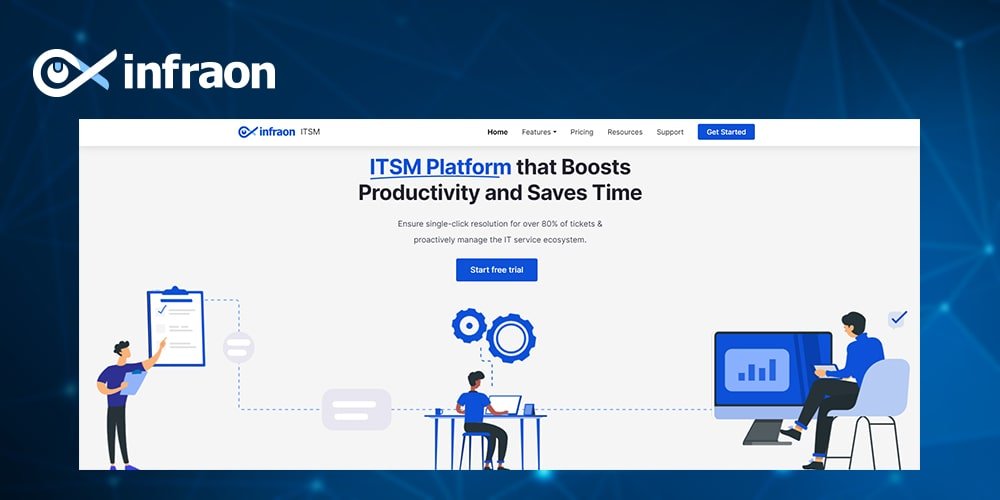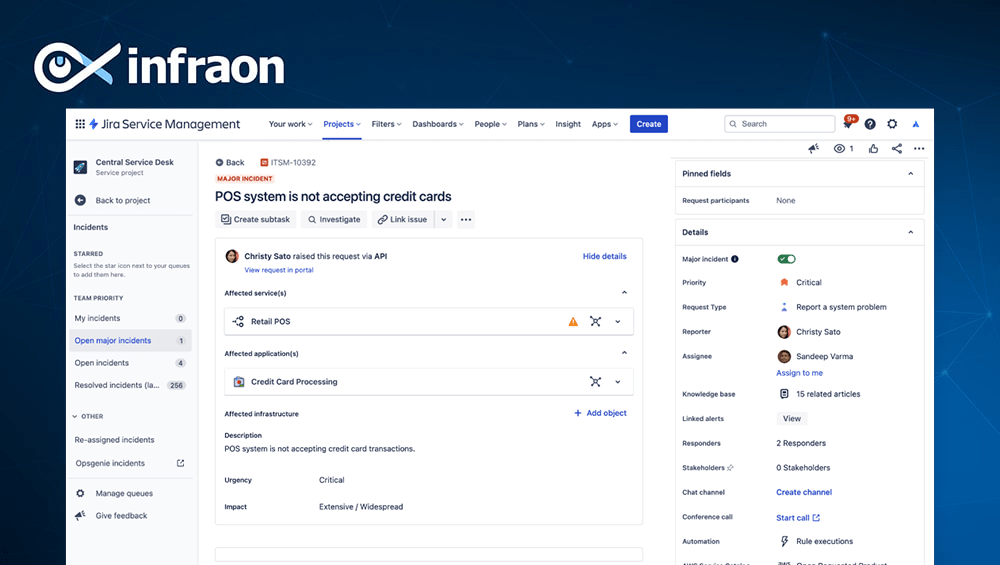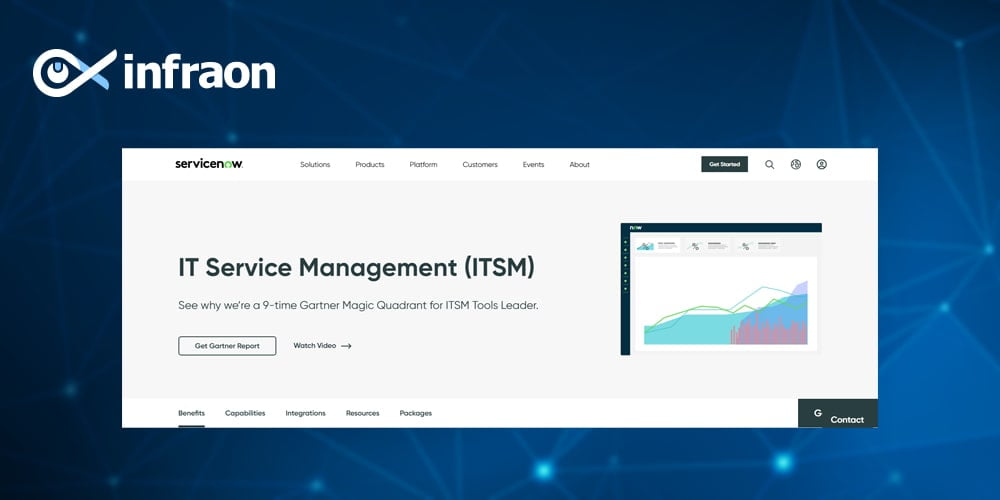In the ever-evolving landscape of IT Service Management (ITSM), the need for effective solutions has become increasingly vital. As organizations strive to enhance their service delivery, evaluating the leading contenders in the market has become imperative. In this compelling blog, we embark on a captivating exploration of the intense competition between Jira ITSM, ServiceNow, and Infraon.
Join us on this journey as we delve into their remarkable features, functionalities, and groundbreaking innovations, ultimately unraveling the most effective ITSM platform for your business in the year ahead.
But first, knowing the roadblocks that ITSM solution providers may face in this journey is important.
Related blog: Jira ITSM Pricing Plan & Cost Guide
So, let’s look at such challenges that you should be wary of before finalizing the right solution/platform.
Constant technological advancements
Choosing the right ITSM solution has become challenging due to constant technological advancements. With new tools and platforms emerging regularly, organizations face complexities in keeping up with the changing IT landscape. It’s crucial to ensure that the chosen solution aligns with the latest technologies to avoid using outdated or incompatible tools.
To overcome these challenges, organizations should research thoroughly, stay updated on technological trends, and prioritize solutions that emphasize innovation and adaptability. Regularly assessing compatibility with emerging technologies and evaluating integration capabilities will help organizations stay ahead in the dynamic IT landscape.
Complex integration requirements
As organizations increasingly rely on multiple systems, applications, and tools to support their IT operations, seamless integration between these disparate systems becomes crucial for efficient workflow management and data exchange. The challenge lies in finding an ITSM solution that can seamlessly integrate with existing systems and tools within the organization’s IT ecosystem. Each system may have its own unique data formats, protocols, and APIs, making integration a complex and time-consuming process. Compatibility issues, data synchronization, and maintaining data integrity across systems further add to the complexity.
To overcome this challenge, organizations need to thoroughly evaluate the integration capabilities of each ITSM solution under consideration. Assessing the range of pre-built integrations, APIs, and connectors available, as well as the ease of customization and configuration, is crucial. The solution should support the necessary integration protocols and provide robust documentation and support to streamline the integration process.
Security and Compliance
As cyber threats become more sophisticated, ensuring the security of ITSM solutions and the data they handle is critical. Solution providers must implement stringent security measures to protect sensitive information, including customer data and intellectual property. Additionally, they must comply with industry regulations and standards such as GDPR, HIPAA, or ISO 27001. Meeting these requirements while delivering a user-friendly experience can be challenging, requiring dedicated resources and ongoing security audits.

To ensure the right ITSM solution is chosen, organizations must conduct a thorough evaluation of security features, compliance certifications, and the track records of potential providers. Engaging in meaningful discussions with providers regarding their security practices, data protection measures, and compliance processes is essential. This proactive approach enables organizations to gather the necessary information and make informed decisions, selecting an ITSM solution that aligns with their specific security and compliance requirements.
Scalability and performance
ITSM solutions must be able to handle the growing demands of organizations as they scale their operations. Providers need to design solutions that can handle increased user loads, high volumes of data, and complex workflows without compromising performance.
Scalability challenges may arise in terms of hardware resources, database management, network infrastructure, and application architecture. Providers must invest in scalable infrastructure, conduct rigorous performance testing, and optimize their solutions to ensure they can support growing user bases and expanding IT environments.
Customization and Flexibility
Highly customized solutions may deviate from established best practices and industry standards. This can make it challenging to align with recognized methodologies and frameworks, hindering interoperability and collaboration with other organizations.

While customization and flexibility are valuable, striking the right balance is essential. Organizations should carefully evaluate their specific customization needs, weigh the benefits against the challenges, and consider the long-term implications before choosing an ITSM solution. It’s important to find a solution that offers a suitable level of customization and flexibility without compromising scalability, support, and adherence to industry standards.
Three leading ITSM solution providers
Now, let’s explore and compare Jira ITSM, ServiceNow, and Infraon – three leading ITSM solutions – to help you make an informed decision on the best fit for your organization.
Infraon

Infraon, an emerging player in the ITSM market, brings a comprehensive suite of IT service management solutions that focus on simplifying IT operations and boosting productivity. With automation at its core, Infraon streamlines processes and enables organizations to achieve operational excellence. The platform offers essential features like incident management, problem management, change management, and asset management, addressing the core aspects of ITSM.
One of Infraon’s standout strengths is its ease of implementation and user-friendly interface. The platform’s intuitive design allows users to quickly adapt and start leveraging its functionalities, minimizing the learning curve. Moreover, Infraon supports integration capabilities with third-party tools, facilitating seamless collaboration across different departments and systems. With its emphasis on simplicity and productivity, Infraon offers a viable option for organizations seeking to optimize their IT service management processes efficiently.
Jira ITSM

Jira ITSM, developed by Atlassian, has emerged as a leading choice for organizations seeking a comprehensive ITSM solution. With its robust project management capabilities, Jira ITSM seamlessly integrates service management into existing workflows, streamlining operations and enhancing efficiency. One of the standout features of Jira ITSM is its remarkable flexibility, allowing teams to customize and adapt workflows to meet specific requirements. This adaptability empowers organizations to tailor the solution to their unique needs, ensuring smooth incident resolution and fostering collaboration across teams.
The user-friendly interface of Jira ITSM promotes effective collaboration, enabling teams to work together seamlessly and deliver exceptional services. Additionally, Jira ITSM’s seamless integration with other Atlassian products, such as Jira Software and Confluence, offers a cohesive and comprehensive solution for organizations already utilizing these tools. By leveraging the strengths of Jira ITSM, organizations can optimize their IT service management processes and drive successful outcomes.
ServiceNow

ServiceNow stands as an industry-leading ITSM platform, offering organizations a comprehensive suite of functionalities to revolutionize their service management processes. With a unified platform approach, ServiceNow empowers businesses to streamline operations and elevate service delivery to new heights. Covering every aspect of ITSM, the platform encompasses a wide array of capabilities, including incident management, problem management, change management, and asset management.
ServiceNow goes beyond traditional ITSM solutions by harnessing automation and AI-powered features. This strategic integration leads to increased efficiency and productivity gains, enabling organizations to drive better outcomes. Additionally, ServiceNow’s robust reporting and analytics capabilities provide valuable insights that facilitate process improvement and aid in informed decision-making. By leveraging these powerful features, organizations can optimize their IT operations, enhance customer satisfaction, and stay ahead in today’s fast-paced business landscape.
Infraon vs. Jira ITSM vs. ServiceNow: A comparative study
Functionality, Customization, and Integration
When evaluating ITSM solutions, organizations need to consider various factors, including functionality, customization options, and integration capabilities.
All three solutions provide a wide range of ITSM functionalities, including incident management, problem management, and change management. Jira ITSM’s strength lies in its flexibility, allowing teams to extensively customize their workflows to match specific requirements. This makes it suitable for organizations that value adaptability and tailoring their ITSM processes. ServiceNow, on the other hand, offers a comprehensive suite of out-of-the-box features, making it an ideal choice for organizations seeking a standardized and comprehensive solution.
Infraon provides essential ITSM capabilities while focusing on simplicity and ease of use, making it suitable for organizations looking for quick deployment and an intuitive user experience.
Integration
Integration capabilities are crucial for seamless collaboration and data flow across various departments and systems. Jira ITSM seamlessly integrates with other Atlassian products, creating a unified ecosystem for project management and collaboration. ServiceNow excels in integration, providing extensive capabilities to connect with third-party tools and platforms. This enables organizations to achieve efficient data sharing and collaboration across multiple systems.
Infraon also offers extensive integration options, similar to Jira ITSM and ServiceNow.
User Experience
The user experience of an ITSM solution plays a significant role in user adoption and productivity. Jira ITSM’s user-friendly interface and intuitive design make it easy for teams to adapt and collaborate effectively. ServiceNow offers a visually appealing and modern interface, ensuring a consistent user experience across its modules.
Infraon focuses on simplicity, ensuring that users can quickly grasp and navigate through the platform’s functionalities.
Scalability and Pricing
Scalability and pricing are important considerations for organizations of all sizes. Jira ITSM offers flexible pricing plans based on the number of users, making it suitable for organizations of varying sizes. ServiceNow, being an enterprise-grade solution, may be more suitable for larger organizations with complex IT operations. ServiceNow’s pricing typically follows a subscription model and can vary based on the modules and customization requirements.
Infraon, being a growing player in the market, offers competitive pricing and scalability, making it an attractive option for small to medium-sized businesses.
Related blog: 25 Best Jira Service Management Alternatives in 2023
Conclusion
When selecting an ITSM solution for your organization, it is crucial to consider your specific needs, budget, and long-term goals. Jira ITSM, ServiceNow, and Infraon are all strong contenders in the market, each offering unique strengths and features. Jira ITSM provides flexibility and adaptability, ServiceNow offers extensive functionalities and integration capabilities, while Infraon focuses on simplicity and user-friendliness. By evaluating these solutions based on functionality, customization, integration, user experience, scalability, and pricing, you can make an informed decision that aligns with your organization’s requirements and objectives.



















